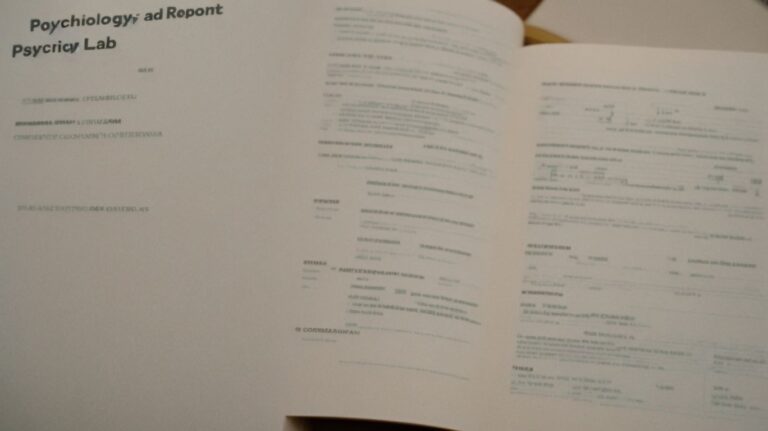The Minnesota Multiphasic Personality Inventory (MMPI) is a widely used psychological assessment tool that has been a cornerstone of psychological testing for decades. In this article, we will delve into the history of MMPI, how it is used in psychology, and the various scales and interpretations associated with it.
We will also address the criticisms and controversies surrounding MMPI, as well as the future of this assessment tool in the field of psychology. Join us as we demystify the MMPI and gain a deeper understanding of its role in psychology.
Contents
- 1 Key Takeaways:
- 2 What Is MMPI?
- 3 History of MMPI
- 4 How Is MMPI Used in Psychology?
- 5 Understanding the Scales of MMPI
- 6 Interpreting MMPI Results
- 7 Criticism and Controversies Surrounding MMPI
- 8 Future of MMPI in Psychology
- 9 Frequently Asked Questions
- 9.1 What is MMPI and why is it important in Psychology?
- 9.2 How is MMPI different from other personality tests?
- 9.3 Is MMPI suitable for everyone?
- 9.4 Can MMPI be used for employment or legal purposes?
- 9.5 What are the different scales in MMPI and what do they measure?
- 9.6 Can MMPI results be interpreted on their own?
Key Takeaways:
- MMPI is a widely used psychological assessment tool that measures personality traits and psychopathology.
- Developed by Starke Hathaway and J.C. McKinley in 1943, MMPI has undergone several revisions and is still used today in various clinical settings.
- MMPI results are interpreted based on 3 scales – clinical, content, and supplementary – and have been subject to criticism for potential cultural biases and limitations.
What Is MMPI?
The Minnesota Multiphasic Personality Inventory (MMPI) is a psychological assessment tool used to measure personality traits, psychopathology, and mental health disorders in adults.
The Minnesota Multiphasic Personality Inventory (MMPI) is a comprehensive assessment tool used to evaluate an individual’s personality and mental well-being. It is commonly used in clinical settings, such as psychiatric evaluations, counseling, and treatment planning. The MMPI is also frequently utilized in research studies related to mental health and the assessment of various psychological conditions.
By examining an individual’s emotional stability, thought patterns, and behavioral tendencies, the MMPI provides valuable insights that aid psychologists and mental health professionals in accurately diagnosing and effectively treating their clients. Its extensive approach makes it a valuable tool in understanding and addressing mental health concerns.
History of MMPI
The history of the Minnesota Multiphasic Personality Inventory (MMPI) dates back to its development in the late 1930s by Starke R. Hathaway and J. Charnley McKinley at the University of Minnesota.
Who Created MMPI?
The Minnesota Multiphasic Personality Inventory (MMPI) was created by Starke R. Hathaway and J. Charnley McKinley at the University of Minnesota.
Starke R. Hathaway, a clinical psychologist, and J. Charnley McKinley, a psychiatrist, collaborated to address the need for a comprehensive psychological assessment tool.
Their motivation stemmed from the desire to develop a reliable measure for identifying psychopathology and personality traits. This led to the creation of the MMPI, which has since become one of the most widely used instruments in the field of psychology.
Their combined expertise in psychology and psychiatry brought a multidisciplinary approach to its development, ensuring its thorough evaluation and relevance in diverse clinical and research settings.
When Was MMPI First Introduced?
The Minnesota Multiphasic Personality Inventory (MMPI) was first introduced in the late 1930s as a tool for assessing personality and identifying mental health conditions.
When it was initially developed by Starke Hathaway, a psychologist, and J.C. McKinley, a physician, the MMPI quickly gained attention within the field of psychology due to its innovative approach to assessing an individual’s psychological traits and potential mental health disorders.
Its introduction marked a significant shift in psychological testing and evaluation, as it provided a standardized method for professionals to understand and diagnose a wide range of psychological conditions.
Early applications of the MMPI centered around clinical settings, where it was utilized to aid in the diagnosis and treatment planning for individuals with mental health concerns.
The inventory’s comprehensive nature and ability to measure various aspects of personality and psychopathology made it a valuable tool for mental health professionals.
How Is MMPI Used in Psychology?
MMPI is widely used in psychology by health professionals and clinicians to assess personality traits, diagnose mental health disorders, and provide targeted interventions.
Its versatile applications extend to various settings, including clinical assessments, treatment planning, and the interpretation of results.
In clinical settings, MMPI plays a crucial role in identifying underlying psychological issues, such as depression, anxiety, and personality disorders.
The results obtained from MMPI aid in formulating effective treatment plans tailored to the individual’s specific needs, ensuring personalized and targeted interventions.
The interpretation of MMPI results requires specialized training and expertise, ensuring that the findings are accurately understood and utilized to support the psychological well-being of the individual.
What Types of Psychological Assessments Can MMPI Be Used For?
MMPI can be utilized for a wide range of psychological assessments, including the evaluation of personality traits, identification of mental health disorders, and the assessment of psychopathology.
This well-established tool has been employed in clinical, forensic, and employment settings for decades, demonstrating its versatility and reliability.
In the clinical realm, the MMPI aids in diagnosing conditions such as depression, schizophrenia, and bipolar disorder, providing valuable insights into an individual’s mental well-being.
Its use extends to forensic evaluations, where it serves as a valuable asset in assessing various psychopathological symptoms and personality characteristics in legal contexts.
Employers can utilize the MMPI to gain an understanding of a candidate’s suitability for specific job roles, especially in fields that require emotional resilience and stability.
How Is MMPI Administered?
The administration of MMPI is typically carried out by trained clinicians, who guide the respondent through the completion of the questionnaire and ensure accurate data collection.
Before the administration, clinicians should explain the purpose of the test to the respondent, emphasizing the importance of honest and thoughtful responses. This helps in establishing rapport and reducing anxiety, ensuring that the data collected truly represents the individual’s mental and emotional state.
Clinicians also need to be attuned to the respondent’s behavior during the test, providing support if any distress or discomfort arises. The administration process involves careful observation to prevent any attempt at manipulation or invalidating responses.
Understanding the Scales of MMPI
A comprehensive understanding of MMPI involves familiarity with its various scales, including clinical scales, content scales, and supplementary scales, which provide valuable insights into an individual’s psychological profile.
The clinical scales, consisting of 10 scales, are used to assess and diagnose various clinical conditions, such as depression, paranoia, and schizophrenia. These scales enable clinicians to pinpoint specific areas of concern and formulate tailored treatment plans.
The content scales, with their 15 distinct scales, gauge an individual’s attitudes, belief systems, and behavioral patterns, shedding light on specific aspects of their personality and psychological functioning.
The supplementary scales, encompassing scales such as the Addiction Potential Scale and the College Maladjustment Scale, offer additional dimensions for evaluating an individual’s psychological traits and potential challenges.
Clinical Scales
The clinical scales of MMPI are designed to assess a wide range of psychiatric disorders and mental health conditions, providing valuable diagnostic information for clinicians and mental health professionals.
The MMPI clinical scales, including the Hs, D, Hy, Pd, Mf, Pa, Pt, Sc, Ma, Si, and the supplementary scales, serve as a comprehensive measure of an individual’s psychological functioning, personality traits, and potential mental health disturbances.
These scales gather insights into areas such as depression, anxiety, paranoia, psychopathic deviance, masculinity-femininity, social introversion, hypomania, psychasthenia, schizophrenia, paranoia, and other significant psychological aspects.
By analyzing the responses to a series of statements from the test taker, mental health professionals can gain valuable insight into the individual’s emotional and cognitive functioning, personality structure, and potential mental health challenges.
Content Scales
Content scales in MMPI focus on assessing specific aspects of psychopathology and personality traits, providing nuanced insights into an individual’s psychological functioning and behavioral patterns.
These scales play a crucial role in evaluating a wide range of psychopathological symptoms, such as depression, anxiety, paranoia, and psychosis. This allows practitioners to gain a comprehensive understanding of the individual’s mental health.
Additionally, MMPI content scales are instrumental in identifying personality characteristics, including introversion, extroversion, conscientiousness, and openness. This contributes to a holistic depiction of an individual’s psychological makeup.
By integrating these assessments, clinicians can tailor treatment plans and interventions with greater precision. This addresses the specific psychosocial needs of each client.
Supplementary Scales
Supplementary scales in MMPI offer additional interpretive information that contributes to the overall validity and clinical context of the psychological assessment, enriching the understanding of an individual’s psychological profile.
These scales, such as the Depression Scale (D), Hysteria Scale (Hy), Psychopathic Deviate Scale (Pd), and Social Introversion Scale (Si), provide nuanced insights into specific aspects of a person’s psychological functioning.
The Depression Scale, for instance, evaluates the intensity of an individual’s depressive symptoms, shedding light on their emotional state and potential treatment needs.
Similarly, the Hysteria Scale captures the presence of somatic symptoms and the tendency to experience distress in a dramatic manner, revealing crucial information for diagnosis and intervention.
The Psychopathic Deviate Scale uncovers antisocial tendencies and behavioral deviance, aiding in risk assessment and formulation of appropriate therapeutic strategies.
The Social Introversion Scale, on the other hand, gauges an individual’s comfort in social situations, guiding the clinician in understanding their interpersonal dynamics and potential challenges.
By integrating these supplementary scales into the MMPI interpretive process, clinicians are equipped with a more comprehensive understanding of the multidimensional nature of an individual’s psychological functioning, thereby enhancing the accuracy and clinical utility of psychological assessments.
Interpreting MMPI Results
The interpretation of MMPI results requires clinical expertise and a nuanced understanding of psychological assessment, enabling clinicians to derive valuable insights into an individual’s mental health, personality, and potential disorders.
By analyzing the responses to the MMPI items, clinicians can gain an in-depth understanding of the test-taker’s emotional, behavioral, and psychological functioning.
The results provide significant indicators and patterns that can unveil potential mental health disorders, such as depression, anxiety, or personality disorders.
The interpretation of the results involves assessing the validity and reliability of the responses, as well as considering the context and individual differences.
This process helps clinicians tailor their approach to therapy, treatment plans, and interventions to address the specific needs and challenges highlighted by the MMPI results.
The insights derived from the interpretation of MMPI results can contribute to the development of comprehensive psychological assessments and inform collaborative efforts among multidisciplinary teams to support the well-being and mental health of the individual.
Criticism and Controversies Surrounding MMPI
Despite its widespread use, MMPI has faced criticism and controversies, including concerns about cultural bias, limitations in diagnosing certain conditions, and the appropriate interpretation of results.
One of the major criticisms of MMPI is the cultural bias inherent in the test. Critics argue that the test items and scoring metrics may not accurately capture the experiences and mental health issues of individuals from diverse cultural backgrounds. This raises concerns about the validity and reliability of the test in diverse populations.
The limitations in diagnosing certain conditions, such as malingering or response bias, are a cause for concern. These limitations may lead to misdiagnosis or inaccurate assessment of psychological conditions, potentially resulting in inappropriate treatment strategies.
Is MMPI Culturally Biased?
One of the criticisms directed at MMPI revolves around concerns about cultural bias, prompting discussions about the impact of cultural diversity on its assessment outcomes.
The potential for cultural bias in the Minnesota Multiphasic Personality Inventory (MMPI) has raised significant concerns in the field of psychological assessment.
Critics argue that the test may not accurately capture the experiences and behaviors of individuals from diverse cultural backgrounds, leading to potential misinterpretation of results and inaccurate diagnostic conclusions.
This debate has highlighted the importance of considering cultural competence in psychological assessment to ensure that the tests are valid and reliable across different cultural groups. This emphasizes the need for culturally sensitive assessment tools and interpretive practices.
Are There Any Limitations to MMPI?
Despite its strengths, MMPI has notable limitations in its ability to accurately diagnose certain conditions and provide comprehensive assessments in specific clinical contexts.
One of the challenges associated with the MMPI is its limited ability to differentiate between specific psychological disorders, especially with overlapping symptoms.
This can lead to misdiagnosis or incomplete clinical assessments, impacting the overall treatment and care plans for patients.
The MMPI may not fully capture certain nuanced aspects of personality or psychopathology, limiting its depth in understanding individual patients’ unique clinical presentations.
Future of MMPI in Psychology
The future of MMPI in psychology holds potential for further developments in assessment methodologies, expanded applications, and the integration of advanced technologies to enhance its effectiveness in clinical and research settings.
Advancements in digital technologies are poised to revolutionize the administration and interpretation of the MMPI. The integration of artificial intelligence and machine learning algorithms could enable more accurate and personalized assessment methods, tailoring the MMPI to individual needs.
The potential expansion of its applications beyond clinical psychology to fields such as forensic psychology and organizational psychology could lead to a broader impact on society. With the ongoing evolution of psychological research and practice, the future of MMPI holds promise for continual advancement and innovation.
Frequently Asked Questions
What is MMPI and why is it important in Psychology?
MMPI stands for Minnesota Multiphasic Personality Inventory, which is a psychological test used to assess an individual’s personality and psychological well-being. It is important in Psychology because it provides valuable information for diagnosing and treating mental health disorders.
How is MMPI different from other personality tests?
MMPI is unique compared to other personality tests because it was specifically designed to measure psychopathology and mental health disorders, rather than general personality traits. It also has a large normative sample, making it a highly reliable and valid assessment tool.
Is MMPI suitable for everyone?
No, MMPI is not suitable for everyone. It is typically used for individuals who are 18 years or older and have a minimum of a 6th grade reading level. It may not be appropriate for individuals with cognitive or developmental disabilities.
Can MMPI be used for employment or legal purposes?
While MMPI is primarily used in clinical settings for psychological assessment, it can also be used for employment or legal purposes. However, it is important to note that using MMPI for these purposes may have limitations and may require additional measures to ensure its validity.
What are the different scales in MMPI and what do they measure?
There are 10 clinical scales and 3 validity scales in MMPI. The clinical scales measure various aspects of an individual’s personality and psychological functioning, such as depression, anxiety, and paranoia. The validity scales assess the individual’s response style and the likelihood of them providing accurate information.
Can MMPI results be interpreted on their own?
No, MMPI results should never be interpreted on their own. It is important for a trained professional, such as a psychologist, to administer and interpret the results in order to provide an accurate and comprehensive understanding of an individual’s personality and psychological well-being.




